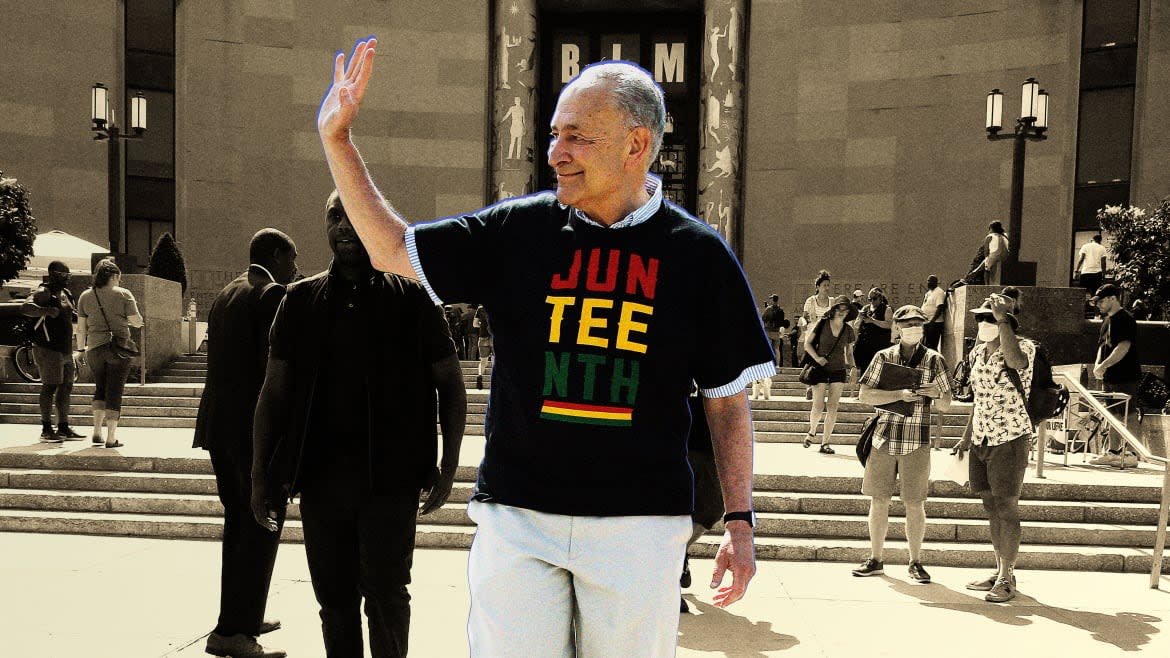Can We Admit Mainstreaming Juneteenth Has Been a Disaster?

- Oops!Something went wrong.Please try again later.
- Oops!Something went wrong.Please try again later.
On June 17, 2021, nearly a year after the murder of George Floyd, President Joe Biden thought it was a bright idea to make Juneteenth an official U.S. holiday—signing it into law, to be observed by all.
“Making Juneteenth a federal holiday is a major step forward to recognize the wrongs of the past,” Senate Majority Leader Chuck Schumer (D-NY), said at the time, “but we must continue to work to ensure equal justice and fulfill the promise of the Emancipation Proclamation and our Constitution.”
Sure, Chuck.
Juneteenth Isn’t for Everyone (and It Shouldn’t Be)
Growing up in Houston, Juneteenth—an event that commemorates June 19, 1865, as the day enslaved Black people in Galveston, Texas, learned they were free (more than two years after the Emancipation Proclamation had been signed)—was a Black holiday in my hometown.
I remember spending my summers down at Galveston Beach and watching the procession of decorated cars with live music proceed as the Jubilee parade commenced. I can still smell the tasty barbeque, remember the gallons of signature red soda passed around, and all that hot sauce doused on my plate as the red and blue Juneteenth flags were waved.
Juneteenth was our Fourth of July—a celebration which reminded me that the South still had something to say, and that Black people didn’t have to wait for the validation of our white peers to gather around our history.
Since the racial uprisings of 2020, this sacred holiday has now become mainstreamed into something that now feels whitewashed, co-opted, and highly performative.
It’s hard to witness something so personal in your life become ruined on the national stage—that’s the current case with Juneteenth.
The Ron DeSantis Presidential Campaign Kicked Off Already… in 1964
I started to notice it last year when Walmart thought it was being progressive when they released a red velvet and cheesecake-flavored Juneteenth ice cream with a Pan-African decorated carton.
Fun fact: Juneteenth has never incorporated African themed colors/designs as part of its official flag (organizers use red, white, and blue to replicate the U.S. and Texas state flags)—Walmart just couldn’t help but pander to customers as a way to flex that they were recognizing Black people. The controversy led to the corporation to apologize and discontinue the line of tone-deaf ice cream, along with canceling other ill-advised Juneteenth-themed merchandise it was selling.
But it’s not just Walmart. Last year, the Children’s Museum of Indianapolis had to go into full-apology mode after attempting to incorporate a watermelon salad as a part of its “Juneteenth Jamboree” menu. This year, a cringy banner created by a Greensville, South Carolina, non-profit hosting a Juneteenth event made headlines for promoting “an upstate celebration of freedom, unity and love” that featured an image of a white couple.
After public backlash from activists and community members, the organization, Juneteenth GVL Inc, issued an apology on social media.
Even worse, with the rise of far-right conservatism throughout the country—it’s gotten even harder for groups to even celebrate Juneteenth in peace.
Juneteenth organizers in Pittsburgh are now accusing Pennsylvania legislators and their city government of discrimination regarding last-minute mandates for vendors and security. In Tennessee, some legislators are threatening sponsors—such as Nashville International Airport (BNA)—to divest from backing local Juneteenth festivals or face public retaliation for supporting “radical agendas.”
In so many ways, the desire to mainstream Juneteenth has now led to much of its press and publicity being met with pandering or controversy. It reminds me of Black History Month, when perhaps there was a moment in time in which America tried to take the shortest timeframe of the year seriously to acknowledge the contributions of Black people. Or perhaps Juneteenth has quickly descended into the rainbow capitalism vibes of Pride month—during which more of the festivities are being monetized for high visibility, without any intentional focus on the community.
Skip Corporate Juneteenth Branding, Invest in Black People
So, great, more people know about Juneteenth—but how does that actually ensure the very freedoms and concepts of emancipation for Black Americans that the holiday speaks of?
For what it’s worth, symbolism will do nothing to liberate a marginalized group. At a time when racial disparities continue to worsen and white supremacy feels even more visibly prevalent—corporations and city/state governments bandwagoning on Juneteenth celebrations do very little to combat this reality.
As with Black History Month, I would like to see these powerful institutions actually put their money/policies/influence where their mouths are and let Black people celebrate Juneteenth in peace. Seriously, there are some things that should just be left alone.
Translation: Less means more when it comes to observing Juneteenth—because our nation’s current infatuation with it is causing more harm than good.
Get the Daily Beast's biggest scoops and scandals delivered right to your inbox. Sign up now.
Stay informed and gain unlimited access to the Daily Beast's unmatched reporting. Subscribe now.

